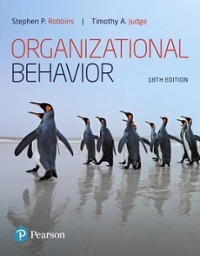Teachers dont have a chance to talk to each other very much ... it is an amazingly
Question:
“Teachers don’t have a chance to talk to each other very much ... it is an amazingly lonely profession,” John Ewing, president of Math for America, notes. Math for America is a nonprofit that aims to improve science, technology, engineering, and math (STEM) teaching excellence by rewarding those who excel at it already. Another standout element of its model is to combat loneliness by forging a community of mutual social support. By providing opportunities to network and form relationships with other teachers, and thus create a community of STEM educator professionals, Ewing hopes that “it keeps people who are in their eighth or ninth year ... teaching.” Steven Miranda, the managing director of Cornell University’s Center for Advanced Human Resource Studies, suggests that loneliness may not just lead to turnover but also to poor motivation and organizational citizenship behavior (OCB). “I would bet my bottom dollar that people who are lonely and disengaged at work deliver far less discretionary effort than people who have a support system or a go-to person.”
Research corroborates Miranda’s and Ewing’s observations: A study of over 500 Macanese school teachers suggests that workplace loneliness has an impact on job performance and OCB. The reason is that lonely employees do not have high-quality exchanges with their leaders and coworkers. Additional research suggests that loneliness not only negatively affects performance but also can lead to critical health problems, cognitive decline, and even early death—some are even calling it a public health epidemic.
Loneliness can be cumbersome for leadership as well. As Jim Hertlein, managing director of Boyden (an executive search firm), says, “A CEO’s role is probably the loneliest in the business ... they’re expected to be always on their game. They’re not allowed to have a bad day.” However, this might be contingent on the degree of power that leaders have. Studies have shown that having more power actually decreases one’s loneliness. This might be because those in power often feel the need to belong a lot less and thus feel less lonely.
Questions
1. How might a volatile work environment in which changes occur constantly affect loneliness? How might a stable work environment where the status quo does not change affect loneliness?
2. Who do you think loneliness tends to be more of a problem for, employees or their supervisors (or managers or executives)? Explain.
3. What role does society play in crafting a global corporate culture of loneliness? Explain.
Step by Step Answer:

Organizational Behavior
ISBN: 9780134729329
18th Edition
Authors: Stephen RobbinsTimothy JudgeTimothy Judge, Timothy Judge





